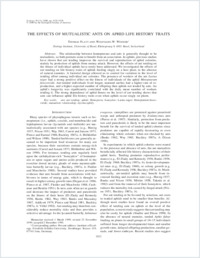The effects of mutualistic ants on aphid life history traits
- Flatt, Thomas University of Basel
- Weisser, Wolfgang W. Friedrich-Schiller University
-
2000
Published in:
- Ecology. - 2000, vol. 81, no. 12, p. 3522-3529
aphid
ant
ant tending
Homoptera
honeydew
Lasius niger
Metopeurum fusco-viride
mutualistic relationship
myrmecophily
English
The relationship between homopterans and ants is generally thought to be mutualistic, as both partners seem to benefit from an association. In aphids, previous studies have shown that ant tending improves the survival and reproduction of aphid colonies, mainly by protection of aphids from enemy attack. However, the effects of ant tending on the fitness of individual aphids have rarely been addressed. We investigated the effects of ant tending on life history traits of aphids feeding singly on a host plant, in the absence of natural enemies. A factorial design allowed us to control for variation in the level of tending effort among individual ant colonies. The presence of workers of the ant Lasius niger had a strong positive effect on the fitness of individuals of the aphid Metopeurum fuscoviride. Ant-tended individuals lived longer, matured earlier, had a higher rate of reproduction, and a higher expected number of offspring than aphids not tended by ants. An aphid’s longevity was significantly correlated with the daily mean number of workers tending it. The strong dependence of aphid fitness on the level of ant tending shows that ants can influence aphid life history traits even when aphids occur singly on plants.
- Faculty
- Faculté des sciences et de médecine
- Department
- Département de Biologie
- Language
-
- English
- Classification
- Biological sciences
- License
- License undefined
- Identifiers
-
- RERO DOC 324294
- DOI 10.1890/0012-9658(2000)081
- Persistent URL
- https://folia.unifr.ch/unifr/documents/307761
Statistics
Document views: 78
File downloads:
- 2000_ema2.pdf: 363
